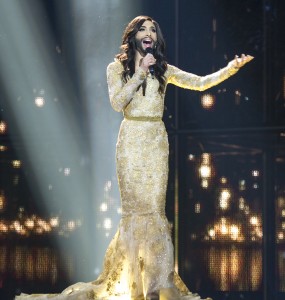 Teenage blond twins singing a duet about love rarely are rejected with vigor. But that’s just what happened in this year’s Eurovision Song Contest (ESC) when the audience booed Russia’s entry. Rather than a sudden aversion to twins or love songs, the precedent-setting event was primarily a reaction to Russia’s recent controversial politics: anti-gay laws and the annexation of Crimea.
Teenage blond twins singing a duet about love rarely are rejected with vigor. But that’s just what happened in this year’s Eurovision Song Contest (ESC) when the audience booed Russia’s entry. Rather than a sudden aversion to twins or love songs, the precedent-setting event was primarily a reaction to Russia’s recent controversial politics: anti-gay laws and the annexation of Crimea.
If Russia wasn’t successful, it was a darker horse that was: an Austrian bearded drag queen who sang an empowering song titled “Rise like a Phoenix.” Conchita Wurst, decked out in a long glittering gown, long eyelashes and a full beard, climbed the stage after her victory was announced, and the ESC venue in Copenhagen echoed with her message: “This night is dedicated to everyone who believes in peace and freedom. You know who you are. We are unity, and we are unstoppable.” And unity, especially at the contest, wasn’t guaranteed. Due to controversial the nature of Conchita’s performance, speculation before the content even began suggested that the votes casted for Conchita would reveal a geographical divide of European countries by sexual attitudes; that is, the Western and Northern part of Europe were expected to reflect progressive attitudes, while the South and especially the Russian-influenced East were expected to reflect more conservative ones. Although a distinction was clearly noticeable in the final results, the votes don’t reflect so much static national values, but changing attitudes all across Europe.
The Eurovision Song Contest is an annual affair established in 1956 for the purpose of fostering good relations among the countries in war-torn Europe. In time, ESC grew to be the largest song competition in the world, with around forty countries from Europe and the wider region entering every year. The competition consists of two semi-finals, in which countries have to qualify — via a complex voting system — for the final contest. Each country combines votes from a popular televote and from an expert jury of five members for a cumulative score. The countries then give points on a scale of one to 12 to the top entries. Overall, that means that votes can be tracked by country, and that they reflect — at least to some degree — popular opinion. Tracing the votes for Conchita from the participant countries reveals a visible pattern of division. For example, the countries from the former Soviet Union (excluding the Baltics) gave the Austrian winner an average combined score of 4.4 points. The rest of the ex-communist countries gave her performance an average combined score of 6.0 points, while Scandinavia, Western Europe, Greece and Israel gave it an average of 10.5 points. This shows the expected East-West divide of sexual attitudes in the continent. However, these numbers are the final scores, the combinations of jury votes and popular votes; the geographical discrepancy is much smaller if only the popular votes are considered. The average popular vote score from the countries of the former Soviet Union was 8.0. The same score was 7.3 from the other ex-communist countries and 10.0 in Scandinavia, Western Europe, Greece and Israel. The scores given by the jury can be seen as a reflection of the anti-gay politics that have plagued Eastern European countries.
The popular vote may reflect changing progressive attitudes on sexuality in the East. And there’s already precedent for ESC to be a referendum on popular attitudes, even from Russia. In 2003, well before Putin’s new anti-gay policies, Russia chose its faux-lesbian duo t.A.T.u to represent the country at the ESC (the same duo that performed at the opening of the Sochi Olympics). At the Eurovision event in 2007, Russia gave the Ukrainian drag performer Verka Serduchka the highest points possible. Russian popular progressiveness, even in the face of the new laws, may have shown through this year as well when Russian televoters awarded Conchita Wurst third place. The leader of the Russian LGBT organization Equality called Conchita’s victory a great compensation for the rocky trails of Russia’s recent policies.
Several polls reflect this slight positive change in the attitudes. The Russian independent organization for popular polling, Levada Center, conducted research on Russian attitudes towards homosexuality in 2010. Even though the results showed that 74% of Russian citizens do not view or recognize homosexual relationships as legitimate and, in fact, think of them as immoral, 45% of the country’s citizens believe that homosexuals should be treated equally by the state. Of those questioned, 15% were undecided on the matter, while 41% were against equal treatment. Judit Takacs and Ivett Szalma from the Council of European Studies also note a slight, but positive, increase in the attitudes toward homosexuality in Russia in the last ten years. In the light of the active anti-gay politics led by the Russian government, these slight changes show a fertile soil where the seed of liberal Russia can be planted — if Putin’s politics stand out of the way.
Eurovision is only one element, but is still an important indicator of emerging patterns. While it is true that there still exists a cultural divide across the continent, Conchita Wurst shows us two interesting facts: the differences between the stances of Europe’s East and West are not as big as one might believe, and amid anti-LGBT policies, Eastern countries are still become more progressive on sexuality. Conchita Wurst’s win may not be the music of a liberal Europe, but it is the bell-ringer of a liberalizing one.
